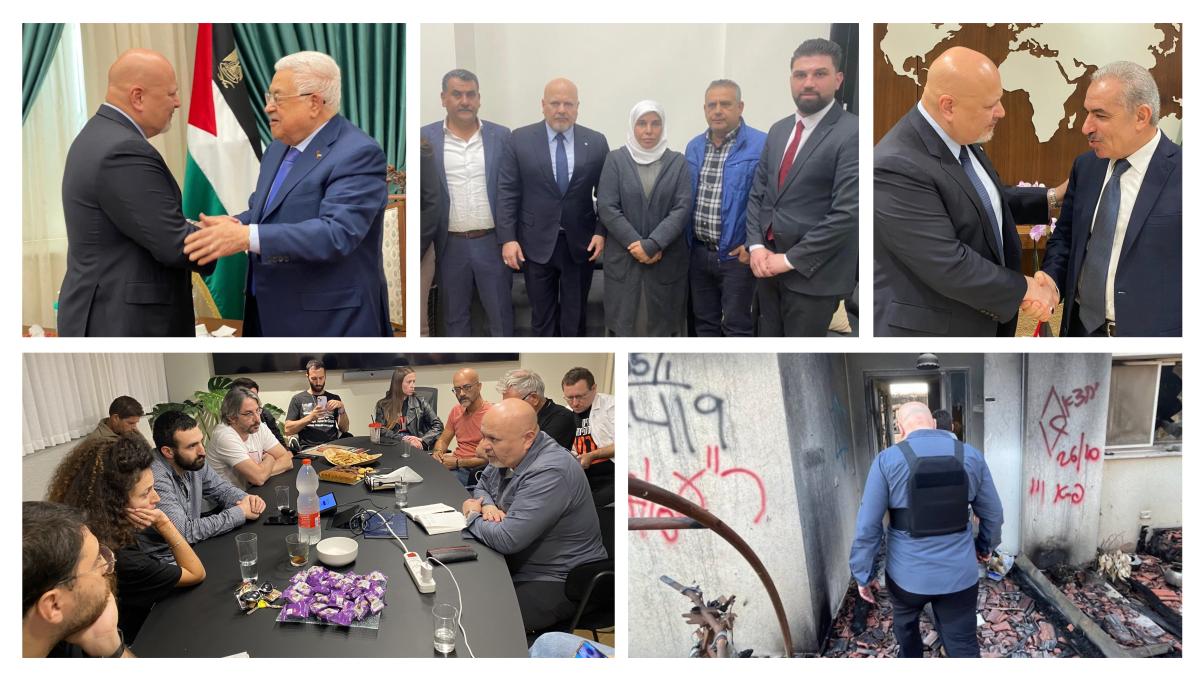The prosecutor of the international criminal court Karim Khan, has been restrained from publicising any new applications for arrest warrants in the court’s Palestine case after judges ordered they must be kept secret, according to an intel report from the Guardian .
In an order issued behind closed doors this month, ICC judges are understood to have told the prosecutor, Karim Khan, he can no longer make public announcements referring to the existence of his applications for arrest warrants or his intention to seek them.
The new order comes as Khan is preparing a fresh round of applications for Israeli suspects in connection to alleged war crimes and crimes against humanity in the occupied Palestinian territories , according to sources familiar with the situation.
Khan has already secured arrest warrants against Israel’s prime minister, Benjamin Netanyahu and his former defence minister Yoav Gallant. A warrant was also obtained for the leader of Hamas’s military wing but was withdrawn after he was confirmed dead.
The recent order imposing constraints on Khan comes amid tensions between the prosecutor and ICC judges over his handling of the Palestine investigation and several other cases in which he publicly announced his decision to seek warrants, a move that departed from his predecessor’s more discreet approach.

Khan has in recent months said he has applied for, but not yet obtained, arrest warrants for Myanmar’s military leader, as well as the Ta liban’s supreme leader and Afghanistan;s Chief Justice. He also indicated at a UN meeting he would seek warrants for people acused of acrocities in Sudan’s West Darfur region.
The flurry of announcements came as Khan faced the prospect of US economic sanctions against him – which materilzed in February and in the wake of sexual misconduct against him by a member of his staff. Khan has denied the allegations, which external investigators are now examining.
According to court officials with knowledge of internal discussions, the publicity generated by Khan’s statements has frustrated ICC judges and staff within the prosecutor’s office due to concerns his actions have departed from routine practice and placed pressure on the judges considering the applications.
In their secret order in the Palestine case, the judges have blocked publicity that even alludes to the filing of applications for arrest warrants, and ordered Khan to refrain from disclosing any forthcoming requests unless he receives their permission.

A separate panel of ICC judges had issued a similar order in at least one other case, three sources said, in an apparent sign of a wider crackdown on Khan’s approach.
A spokesperson for the prosecutor said they “cannot confirm or deny the existence or content of any judicial decision which has not been made public by the court”.
They said the prosecutor acted in accordance with the court’s legal framework and an arrest warrant application was “the outcome of an extensive, independent and impartial investigation in a situation under the court’s jurisdiction”.
The process for applying for ICC arrest warrants often occurs in closed proceedings. This can be to protect the integrity of investigations, ensure the safety of witnesses and victims, and improve the chances of locating and apprehending suspects.
However, the prosecutor has significant autonomy and is able to publicise arrest warrant applications if, for example, it could have a deterrent effect on continuing alleged crimes and does not hinder arrest opportunities.
Khan’s predecessor Fatou Bensouda revealed the existence of an arrest warrant only after it was approved by judges. The court’s first chief prosecutor, Luis Moreno Ocampo, publicly announced his intention to file applications on three occasions during his nine-year term.
Once approved, an arrest warrant confirms there are “reasonable grounds to believe” the accused individual has committed a crime within the ICC’s jurisdiction, and establishes a legal mechanism to bring the accused to the court, which is based in The Hague, to stand trial.
Khan first publicly announced an arrest warrant application in 2022, less than a year into his term, for suspects accused of crimes in Georgia. He repeated the strategy last year, when he revealed requests for warrants in the court’s Palestine investigation for Israeli and Hamas leaders in a dramatic video interview and interview with CNN.
The prosecutor’s decision to publicize the first round of arrest warrants in the Palestine case was opposed by some of Khan’s most senior staff, according to sources with knowledge of the investigation. The move, they said, placed the three judges overseeing the case under unprecedented public pressure.
The panel of judges, which approved the warrants in November appear to have now prevented Khan from following a similar approach when he files new arrest warrant applications in the case. Court sources said they expected the warrants to focus on alleged crimes in the West Bank.
Bensouda launched the ICC’s Palestine case as a formal criminal investigation in 2021. Khan inherited the inquiry and accelerated it after the Hamas-led 7 October attacks and Israel’s ensuing bombardment of Gaza.
The investigation intensified in May 2024 with Khan’s decision to seek warrants for senior Israeli and Hamas officials, but it has continued to examine a range of other alleged crimes, both in the Gaza offensive and in the West Bank where there has been an intensification of Israeli settler violence and deadly military operations.
Source:The Guardian







The ICC’s decision to restrict Prosecutor Karim Khan from publicly announcing arrest warrant applications highlights the court’s internal struggle to balance transparency with judicial discretion—raising questions about accountability, consistency, and the political sensitivities surrounding high-profile cases like Palestine.